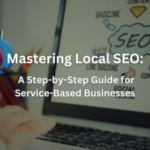
When your business has a local audience who can visit your website or physical location, local SEO should be an integral part of your marketing strategy. It can help grow your web or foot traffic, increase your leads, build brand awareness, grow your sales, and help your business remain relevant.
The following statistics demonstrate how important local SEO can be for small businesses:
- 40% of local SEO campaigns generate at least 500% ROI
- 46% of searches on Google are for local businesses or services
- 82% of smartphone users perform “near me” searches
The growth of smartphone use for local search has changed the way people seek new products and services near them. Search engines have also changed the way they deliver the results. If you want your small business to grow, you cannot ignore the importance of local SEO.
Here are 6 local SEO strategies that can help small businesses dominate their neighborhood online.
1. Optimize Your Google Business Profile (GBP)

Google Business Profile (GBP) allows you to control your business’ presence across Google. It allows you to control the information your prospects and customers can see on Google. This includes information such as:
- Company address and directions on Google Maps
- Website
- Phone number
- Reviews on Google
- Services
- Hours of operation
Once you claim your Google Business Profile, use these tips to ensure it is well-optimized for local SEO:
- Provide Detailed Information: It is recommended that you provide as much info as possible on your GBP. Going beyond the above-mentioned information, add images, categories, and product information.
- Ensure Accuracy: Make sure your company name, address, phone number, and website details are accurate.
- Keep Data Up-to-date: Whenever any changes take place, make sure to update the information in your GBP.
- Earn as many Reviews as Possible: Ask your customers to leave reviews. Provide them with a link to make the process easy. It is also important to respond to all types of reviews, both positive and negative.
2. Earn Reviews
95% of customers check online reviews before they make a buying decision. Reviews not only influence your potential customers’ decisions but also affect local SEO. Positive reviews have the power to elevate your brand.

The following tips can help you earn more reviews:
- Actively Ask for Reviews: Keep in mind that 51% of customers will generally leave a review when asked. Keep the following points in mind when choosing a method to contact your customers:
- Email is the preferred contact mode for 54% of customers.
- 45% of customers prefer requests made in person.
- 29% of customers prefer getting a review request through text.
- Follow-Up: Make sure to follow and remind your customers. Most customers do not leave a review because they forget it.
- Provide Clear Instructions: As mentioned above, it is recommended to provide a direct link to all your customers so that they can easily and quickly leave a review. Remember, 30% of customers will not leave a review because the process can seem to be complicated.
- Respond to Reviews: When you respond to reviews, customers feel like you value their interaction.
If you have any doubts about the effectiveness of reviews in affecting local SEO, consider the following points:
- Review signals contribute to roughly 15% of the local pack rank.
- Number of reviews, its presence across different platforms, and the rate at which it is received within a given period of time are all important factors affecting local SEO.
- Review signals are ranked third among all the 8 major local factors.
Reviews demonstrate authenticity to both your leads and search engines.
3. Target Location Keywords
It is important to optimize your website using relevant location keywords. This can help improve search rankings and attract targeted web traffic.

Follow these tips to find the perfect keywords using a keyword research tool:
- Look for Industry-Focused High-Level Keywords: Brainstorm a list of search terms you think your customers may use to find you. Use those keywords in Google to find the suggestions that appear in the search bar. Check the terms that appear in the “People also ask” section.
- Include Location Terms: Once you have some valuable industry terms, include location terms to create location-based keywords.
- Find Search Volume Data: Use the keyword research tool to get search volume and other data on your chosen keywords. This data can help you shortlist the terms that can drive more traffic.
4. Create Content That Ranks For “Near Me” Searches
Location-based, keyword-rich content is a must for local SEO success. However, such content doesn’t need to be sales-focused or promotional. ‘Near me’ searches have become increasingly popular over the past few years, playing an important role in local SEO. Over the past few years, there has been significant growth in the search for local places using search terms that include the “near me” term compared to those without. Keep in mind that Google now treats “near me” in search terms as a proximity indicator.
5. Build Social Media Presence
Social media activity is also an important signal for local SEO. It is recommended to post regularly on social media and increase your engagement with followers. While it is important to create interesting and valuable content, you should also connect with your audience.

Choose social media platforms where your audience tends to spend more time. This means there is no need to create a profile on every platform. Instagram, LinkedIn, Twitter, TikTok, and YouTube are popular platforms.
Your social media efforts can benefit your local SEO goals directly or indirectly in the following ways:
- Google and other search engines rank social media profiles
- Social media creates opportunities for promoting your content
- While some social media platforms have billions of users, others have hundreds of millions of users. This means the opportunities for promoting content are endless on these social media.
- Social media is a highly effective platform for driving web traffic.
- Social media can contribute to maintaining consistency for your business’ Name, Address, and Phone Number (NAP).
6. Create Accurate Citations or Business Listings
If your business is not already listed on Yelp and Yellow Pages, make sure it is. It is equally important to ensure your listings are accurate. This is important for the users to find you and see you as a legitimate brand name in your industry.
Follow these tips to ensure accuracy and consistency across your citations, as they have an impact on your business’ local SEO:
- There should be consistency across all your contact details on different online listings.
- When creating your profiles, use an email address that you will be using long-term.
- Maintain a spreadsheet of the local listings you have and all the relevant information.
Whether your business’ address has changed or you have been in business for a long time, there is a good chance your citations are out of date. So, periodic checking and updates are highly recommended.
If you want to build your brand presence in a specific market and grow your business, local SEO is a must-have strategy. There are many tactics that need to be implemented to create an effective local SEO strategy. If you need professional help in creating and running successful local SEO campaigns, call the Clear Imaging, Inc. team at 1(800) 380-6942. We can also be reached via this Online Form.






